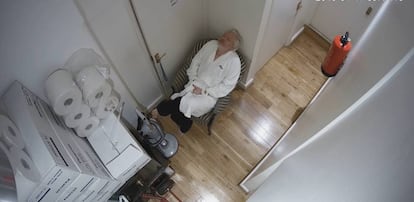Julian Assange spying case: Judge suggests CIA may have received illicitly recorded conversations
Proving that US intelligence services learned about the WikiLeaks founder’s defense strategy by spying on his lawyers could annul the extradition request, say legal sources


The conversations between Julian Assange and his lawyers illicitly recorded by the Spanish security company UC Global at the Ecuadorian Embassy in London, where the WikiLeaks founder took refuge for years, could have been delivered to agents of the US secret services, according to Santiago Pedraz, the judge at Spain’s High Court, the Audiencia Nacional, in charge of the espionage case.
Delivery to the Central Intelligence Agency (CIA) or to US authorities of details about the defense strategy of the cyberactivist, whom the US wants to have extradited from the UK, is reflected in a court order issued by Pedraz to which EL PAÍS has had access. In this document, which deals with procedural issues, the judge explains to the British authorities why he needs to take witness testimony from the British lawyers and Assange’s doctors who were spied on at the embassy. These individuals include Gareth Peirce, 82, the famous British lawyer who was played by actress Emma Thompson in the 1993 movie In the Name of the Father.
Proving that US intelligence services learned about Assange’s defense strategy by spying on his lawyers could annul the extradition by questioning the illegal methods used by the US to get Assange tried there, according to legal sources. If Spain is allowed to take testimony, as victims of US espionage, from lawyers and doctors who are now defending him in the extradition case, the British justice system would be left in an embarrassing situation, according to the same sources. It could be argued that the process was flawed because the right of defense was violated by the country requesting the extradition.
The judge sent a European Investigation Order (EIO) to the British justice more than two years ago, when he requested permission to question Assange in a videoconference from London as a witness in the case against Undercover Global. But British authorities have been reluctant to cooperate, and have asked for additional information on top of documents that were sent months ago without receiving a response. The EIO is a common judicial tool to speed up cooperation between judges and circumvent laborious rogatory letters based on instruments of international law.
In this case, however, the British justice has been blocking the investigation. The British lawyers spied on at the embassy by order of UC Global owner David Morales, and whom Pedraz is asking to interrogate, are the same ones who are now defending Assange in the US extradition request that a British judge has just approved. Home Secretary Priti Patel, one of the toughest members of Boris Johnson’s government, has two months to make the final decision.
The US is charging Assange with 18 crimes for revealing classified information about military operations in Iraq and Afghanistan on WikiLeaks, and he could face up to 175 years in prison. Since his expulsion in 2019 from the Ecuadorian Embassy, the Australian activist has been held in London’s Belmarsh maximum-security prison.
Tu suscripción se está usando en otro dispositivo
¿Quieres añadir otro usuario a tu suscripción?
Si continúas leyendo en este dispositivo, no se podrá leer en el otro.
FlechaTu suscripción se está usando en otro dispositivo y solo puedes acceder a EL PAÍS desde un dispositivo a la vez.
Si quieres compartir tu cuenta, cambia tu suscripción a la modalidad Premium, así podrás añadir otro usuario. Cada uno accederá con su propia cuenta de email, lo que os permitirá personalizar vuestra experiencia en EL PAÍS.
¿Tienes una suscripción de empresa? Accede aquí para contratar más cuentas.
En el caso de no saber quién está usando tu cuenta, te recomendamos cambiar tu contraseña aquí.
Si decides continuar compartiendo tu cuenta, este mensaje se mostrará en tu dispositivo y en el de la otra persona que está usando tu cuenta de forma indefinida, afectando a tu experiencia de lectura. Puedes consultar aquí los términos y condiciones de la suscripción digital.








































